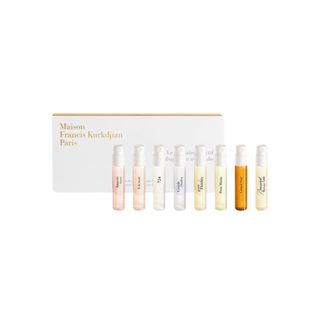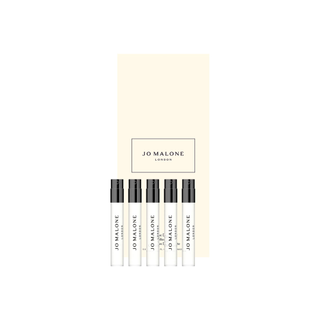It may feel frustrating to constantly hear your peers refer to their 'signature scent' when you've yet to find your own. You want to find that perfume that makes you smell amazing and feel great, but it may just not have happened yet—which is totally okay. "Finding your signature fragrance is a deeply personal journey," says Romy Kowalewski, Founder of 27 87. "It's not about following trends or what social media dictates—it's about truly connecting with the present moment and yourself."
When you consider how many options there are these days (from both high fashion houses and independent perfumeries), it's easy to see why the process of finding 'the one' may seem overwhelming. Luckily, I've learnt the best tips through my own experience and conversations with perfume experts to guide you on your journey.
Want to learn how to find your signature perfume? Follow these five easy steps...
1. Look to your existing collection
Looking back at perfumes you've loved and bought in the past is a great first step to take, according to Lori Woodhouse, Global Director of Education at Creed. "Your choices in the past will not stray far from what you prefer today. Smelling different perfumes will help to develop your nose," she explains.
Take a look at your collection as a whole; is it more woodsy or citrusy? Do you tend to have more lightweight scents or deep, intense elixirs? This can help steer you in the right direction for that key future purchase.
2. Discover which notes you like best
Similarly, honing in further on the kinds of scents you've traditionally liked in the past – and more specifically, what notes they contain – will aid your journey.
"Look at what you have bought in the past and see if there is a common category (citrus, floral, ambery or woody) you keep buying. Then see if there is a common note in the perfumes," begins Lori.
"Also, think if you like lighter perfumes or deeper perfumes. Lighter notes are citrus and aromatics, middle ground are florals, musks and some lighter gourmands notes like vanilla, and deeper perfume notes mean resins, rich spices and woods."
When you have discovered, say, your top five favourite notes (or families), you can look to online tools such as Fragrantica and simply search for perfumes by note or ingredient. Make a list of the ones that sound and look interesting to you, and have this on hand for IRL smelling tests.
3. Browse the fragrance halls
Take your list of perfumes from Fragrantica (or other online perfume finders) with you to your local department store, be it Selfridges, Liberty or Debenhams. The fragrance halls at retail stores are often the absolute best places to discover something new, and potentially find a bottle that feels 'signature' to you.
Start with your list, but be open to brands you may not have heard of before, or fragrances the sales assistants may suggest for you. Make it a day of discovery to help finding your special scent become a fun process.
4. Purchase a discovery set
If you don't live near to a department store or can't get to one, you may want to consider ordering a few fragrance discovery sets online. These also allow you to try more niche, independent perfume houses that are not always available in store everywhere.
Everyone from Maison Francis Kurkdjian and Jo Malone London to Kilian and Creed offer these, and they're brilliant for more than just your signature perfume journey. Handy for travel and great for mixing and layering, most of these sets are fairly affordable and thus offer an accessible route for getting to know more fragrances.

Maison Francis Kurkdjian Fragrance Wardrobe Eau de Parfum Set

Jo Malone London Cologne Discovery Collection
5. Consider how a perfume makes you feel
No matter whether you've visited in store or ordered some discovery sets online, the truest way to find your signature perfume is not just to simply like the way a scent smells, but to analyse how it makes you feel.
"Find a perfume that speaks to you. When you are smelling, think if it feels right; can you see yourself wearing it and does it give the impression you desire?" says Lori, who also recommends always trying a scent on the skin not just from the bottle, as it may smell differently on you when it dries down.
Fragrances are also highly connected to our thoughts and feelings, along with our sense of nostalgia, reminds Romy. "Scents are tied to emotions, memories, and experiences, so let your intuition guide you towards a fragrance that mirrors your state of mind and personal expression in this very moment."
"It’s good to also make a journal and think of what the perfume reminds you of," adds Lori. "You will connect smells to memories; it’s a great way to develop your nose."
Once you find a fragrance you adore the smell of and resonate with how it makes you feel or what it makes you remember, you may just have found your signature scent. If not, keep looking! It's just as much about the journey than the destination in this case.




















 English (US) ·
English (US) ·